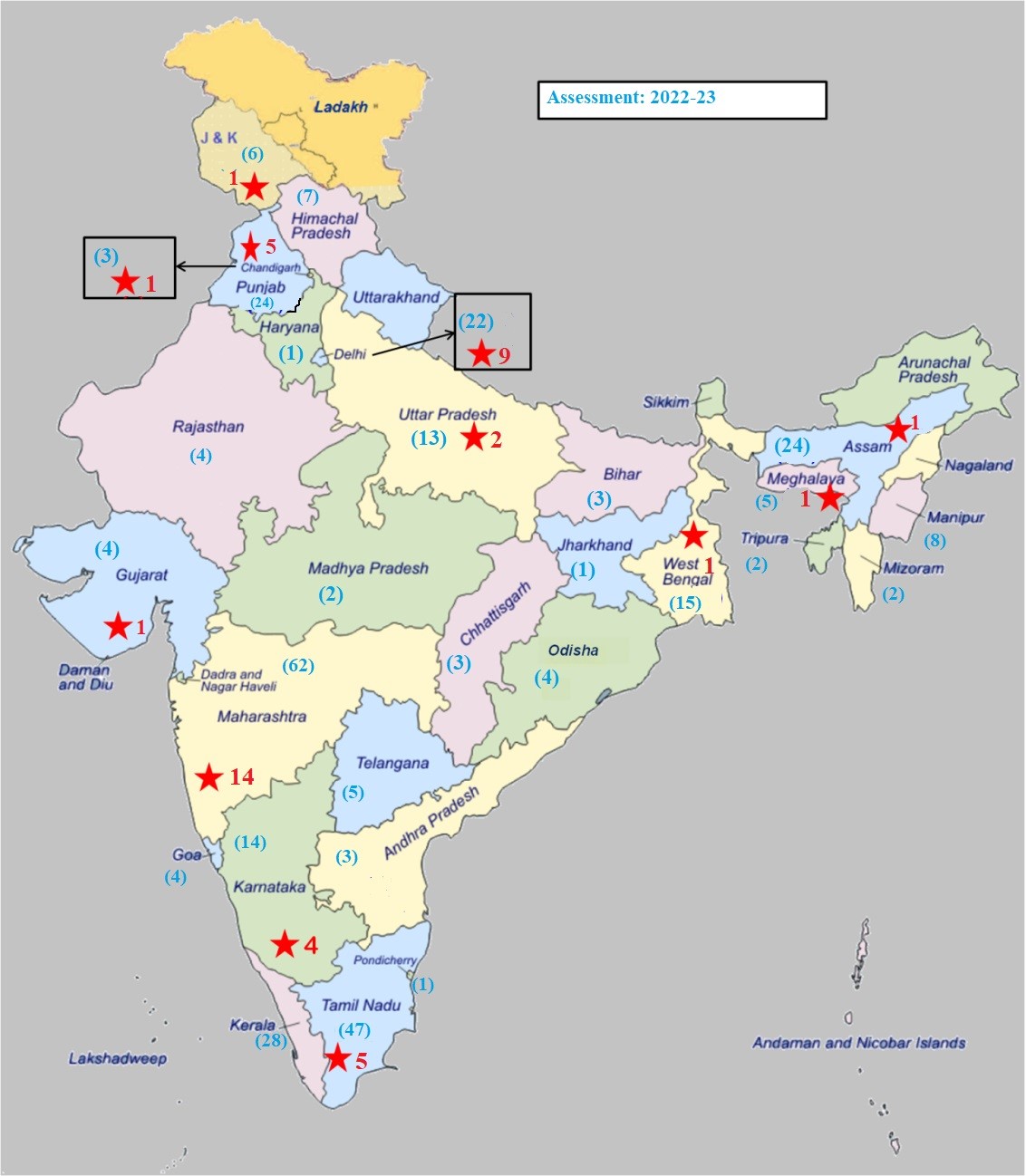
Star College Programme
Background:
Department of Biotechnology (DBT) is committed to the values of i) Pursuit of excellence ii) Academic and intellectual freedom iii) Creativity and innovation iv) Diversity v) Cooperation and Communication & vi) accountability.
The Star College Programme was initiated by DBT in 2008 to support colleges and universities offering undergraduate education to improve science teaching across the country. This Programme was launched for improving critical thinking and encouraging ‘hands on’ experimental science at undergraduate level in basic science subjects. On a larger perspective, the programme was initiated envisioning that it shall encourage more students to take up higher education in science. Through this programme the Department identifies colleges with potential for excellence and provides support for developing infrastructure for academics and laboratory activities. This support is in turn expected to invigorate teaching and provide unique exposure of students to experimental science. Starting with a meager 30 colleges in 2008, this pan India scheme has supported science departments in more than 300 colleges all over the country till date.
Overall, it has been observed that the support received by colleges have resulted in a considerable decrease of student dropout rates in science subjects. Keeping in mind that this is the only programme implemented by the Department to support science education at the undergraduate level, the Star College Programme acts as a gateway and provides exposure to students about other schemes of the Department (and the GOI) to support higher education (post graduate level), graduate research (PhD), post doctoral research, international exchange programmes, short term industry oriented training courses in science. The Programme also acts as a catalyst in igniting young minds (faculty and students) to engage in networking, exposure visits to research institutes and industries and apply for research grants in order to prepare them for future challenges after the successful completion of their undergraduate courses.
The All-India Survey of Higher Education (AISHE), 2020-21 was conducted with reference date as 31.12.2020, a total of 1,113 Universities, 43,796 Colleges and 11,296 Stand Alone Institutions were registered in AISHE 2020-21, Of them, 1,099 Universities, 41,600 colleges and 10,307 Stand Alone Institutions have filled and verified their responses. Uttar Pradesh, Maharashtra, Karnataka, Rajasthan, Tamil Nadu, Madhya Pradesh, Andhra Pradesh, Gujarat, Telangana and Kerala are top 10 States in terms of number of colleges. Number of colleges per lakh eligible population (population in the age-group 18-23 years) in the country is 31. About 43% of the Universities and 61.4% Colleges are in Rural Areas. 10.5% Colleges (4,375) are exclusively for Female, while only 0.2% (72 Colleges) are exclusively for male. About 78.09% of the students are enrolled in undergraduate level courses and remaining 11.5% are enrolled in postgraduate level courses. Based on actual response at undergraduate level, enrollment is highest in Arts (33.5%), followed by Science (15.5%), Commerce (13.9%) and Engineering & Technology (11.9%). At postgraduate level, maximum students are enrolled in Social Science stream (20.56%) followed by science (14.83%) based on actual response. At the under graduate level, the highest out-turn is in Bachelor of Arts (B.A.) with 20.5 Lakh, followed by Bachelor of Science (B.Sc.) with 11.3 Lakh, Bachelor of Commerce (B.Com.) with 10.2 Lakh and 8.3 Lakh in Bachelor of Engineering (B.E.) & Bachelor of Technology (B. Tech.) combined.
The above Stats are result of All India Survey On Higher Education (2020-21); which shows the huge potential in the educational field in India, through the Star College Programme of Department of Biotechnology, we aim to increase the percentage of students opting for Science courses from all over India, further through the program the Department envisions to reach a large number of colleges, as of now the department has already supported more than 300 colleges. It is also planned to reach out to the colleges in the rural areas and to the states which have minimum participation till now like Uttar Pradesh, Bihar, Rajasthan, Madhya Pradesh and Uttarakhand etc.
Further, the Programme is in accordance with the United Nations Sustainable Development Goal-4 to Ensure inclusive and equitable quality education and promote lifelong learning opportunities for all.
In a huge country like India, equitable percolation of the benefits of any pan India scheme is a challenge and the Star College Programme is no exception. As a result, applicant colleges have been categorized into ‘Rural’ (with a special focus on Aspirational districts since 2019-20), ‘Urban’ categories since 2018-19 and “NER” category since 2022-23 based on the geographic location of the college. This was done to ensure that access to better facilities on account of geographical location should not be a deterrent for securing this highly competitive grant. This has created a tremendous interest among colleges from rural areas too which has resulted in exponential increase in number of colleges applying from Tier II, Tier III cities and rural areas.

Map of India depicting total number of Colleges have been supported under the Star College Programme (317) and colleges accorded with Star Status (45) (depicted as *) in different states since inception of the programme.
The key objectives of the Programme is to promote networking & strengthen ties with neighboring institutions & other laboratories, to conduct specialized training programmes for faculty improvement for optimizing technical capabilities, to increase capabilities of core instrumentation resources by procuring new equipment and upgrading of existing facilities, to provide access and exposure to students to research laboratories and industries in the country, to help in devising standard curricula and Standard Operating Procedures (SOP’s) / kits for practicals, to provide better library facility to students and teachers at undergraduate level. To conduct specialized training programmes for faculty improvement for optimizing technical capabilities. Creation and operational support for resource and training facilities for training of college faculty.
The funding shall be provided under following categories:
- Urban Colleges.
- Rural Colleges.
- Special calls: Based on need of the Programme or as suggested by Task Force (e.g. NER Colleges) or areas where there is limited penetration of the Programme.